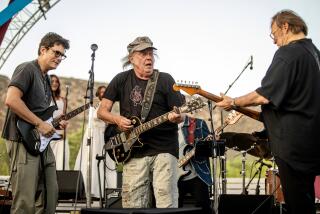JAZZ REVIEW : 2 Hornmen Put the Sun Back in Sunday
- Share via
HUNTINGTON BEACH — The skies outside might have been cloudy and gray, but Sunday afternoon inside Maxwell’s by the Sea, all was sunny and bright, at least as far as the jazz delivered by trumpeter Snooky Young and saxophonist Bob Cooper was concerned.
Stylistically, these veteran Los Angeles-based musicians are of different generations. Young, 71, was reared in the Swing Era, when he played with Jimmie Lunceford and Count Basie in the late ‘30s, and he remains a Roy Eldridge devotee, using lines of few notes but with plenty of rhythmic pop to get his point across. Cooper, 66, of Stan Kenton and Lighthouse All-Star fame, blends the gentle flow of Lester Young with the complex furor of Charlie Parker in concocting statements that alternately quiet you and heat you up.
The first two sets Sunday found the hornmen--who have been leading a small group off and on since the mid-’80s and who were at Maxwell’s with bassist Jim DeJulio’s ace trio--exploring the kind of material you’d expect: numbers that recalled the mainstream period of the ‘30s, ‘40s and ‘50s.
There were several pieces from the Duke Ellington book, including “In a Mellotone,” “Just Squeeze Me” and Billy Strayhorn’s “Take the ‘A’ Train.” Also heard were Tadd Dameron’s timeless ballad, “If You Could See Me Now,” and Ferde Grofe’s “On The Trail.”
Young, who has been a lead trumpet player for most of his career, and who has been with “The Tonight Show” band since 1962, fits into a combo atmosphere as if that was his specialty. His sound is full yet never overbearing, and he varies it with the employment of a triad of mutes.
Take his interpretation of “I Want a Little Girl,” the slow, bluesy tune that Jimmy Rushing first sang with Basie in the late ‘30s. Young began the number by using a cup mute--a silverish object that resembles a miniature flying saucer--tacked on the front of his horn, which gave his utterances a wah-wah effect.
His phrasing had a vocal quality; you could put words to most of his solos and they would make good songs. Then he sang the tune in a raspy, demure voice and with a delivery that showed the same sense of ease as his trumpet work. To close the selection, he used a hand-held blue rubber plunger mute--the one that might as well double as a plumber’s helper--to vary his sound. It was demonstrably more wah-wah- ish than with the cup mute as he held the mute close to the bell, then pulled it away slightly so that the sound seemed to burst from his instrument.
On the medium-tempo “On The Trail,” Young used the Harmon mute, another silverish metal protrusion that results in a gleaming, glowing tone. Here Young’s lines had a smooth, fluid quality, and some be-boplike complexities worked their way into his presentation.
The renditions of “ ‘A’ Train” and “Squeeze Me” exhibited Young’s propensity for brief, rhythmically assured ideas, yet they still showed his ever-present songlike quality.
Cooper, reviewed here recently, was, once again, absolutely first class. His sound was as bold and dark as ever, and greeted like a hug from an old friend. And although his medium- and up-tempo performances had a lot to commend them--he can slide back and forth from twisting, pretzel-like lines to sustained moans in a flash--his ballad work was second to none.
The passion-drenched take of “If You Could See Me Now” was so emotional it could bring tears, and Cooper darted among blues shouts, extended wailing notes and jack-rabbit escapes in his solo.
Bassist DeJulio, pianist Wally Minko and drummer Jim DeJulio Jr. again set the front line up with tasteful accompaniments, and, in their featured moments, swung with elan.
More to Read
The biggest entertainment stories
Get our big stories about Hollywood, film, television, music, arts, culture and more right in your inbox as soon as they publish.
You may occasionally receive promotional content from the Los Angeles Times.








